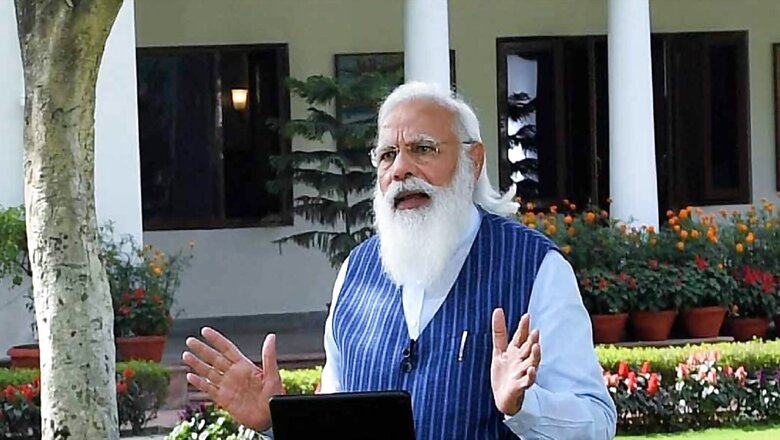
views
Prime Minister Narendra Modi is interested in expediting various infrastructure projects which are stuck in courts and with the National Green Tribunal (NGT). This is the reason why he has sought from Cabinet Secretary Rajiv Gauba the list of all such delayed projects and the losses incurred to the exchequer thereof. While this is a good move, this may not be enough to boost economic development.
It is a well-known fact that projects in India are not stalled just because of lack of compliances or promoters’ disregard for the environment, the local community, etc.; they are also opposed because of political reasons, corporate rivalries, systemic corruption, and doctrinaire activism. Often the factors are intertwined; for example, political and activists’ resistance is funded by the rival companies.
It was against this backdrop that the Prime Minister held a review meeting on August 25. Four ministries have been directed to coordinate the exercise under the monitoring of the Cabinet Secretary. “Ministries of Environment, Forest and Climate Change, Railways and Road Transport & Highways in consultation with Ministry of Law and Justice should identify decisions of Hon’ble Courts, NGT etc., related to land acquisition, forest or other clearances etc. which are causing delay in infrastructure projects,” say the minutes of the meeting.
The delays have already cost the promoters and the nation a great deal. According to a recent estimate by the Ministry of Statistics and Programme Implementation, 483 infrastructure projects of Rs 150 crore or more suffer from cost overruns and 504 from delays. “Total original cost of implementation of the 1,781 projects was Rs 2,282,160.40 crore and their anticipated completion cost is likely to be Rs 2,725,408.00 crore, which reflects overall cost overruns of Rs 443,247.60 crore (19.42 per cent of original cost),” said the Ministry’s July report.
To put things in perspective, India’s defence budget for this fiscal is about 10 per cent more than 4.43 lakh crore. Land acquisition and forest and environment clearances are some of the main hurdles, according to the report.
EXCLUSIVE | PM Modi Wants List of Infra Projects Delayed Due to Court and NGT Orders, Loss to Exchequer
Prime Minister Modi’s concern over the delays is understandable; his decision to seek information about the same will surely help the cause of development; but this has to be complemented with other actions. But before that, the government needs to comprehend the magnitude and complexity of the problem.
Activists, most of them Left-leaning, have caused immense damage. In fact, their constant campaigns ensured that the Korean steel major Posco’s $12-billion plant could not take off. Planned to be set up in Odisha, it would have been the biggest foreign direct investment (FDI) in India.
The Left may not be important today as a political force or intellectual hegemon, but the ideas it expounded and processes it initiated have been imbibed by others. Many of them, ironically, are by ruling party’s associates, especially in the Swadeshi Jagran Manch. They continue to promote the Left-wing causes, like resistance to FDI and privatization.
Besides, there is the safety-first attitude of the bureaucracy. This is worse than the old-fashioned red tape. Years after the sale of public sector assets, government functionaries and private parties had to face criminal cases. In other corruption cases too, top officials had to undergo long trials. One of them is former coal secretary H.C. Gupta (2005-08), who was finally acquitted in 2019.
Economic development at a pace that the Modi government desires is not possible without taking the bureaucracy and investors into confidence.
There is also a need to address the issue of judicial interventions by way of some institutional mechanism. There could be a special bench in the Supreme Court focused on the public interest litigations against infrastructure projects. This bench may hear the cases involving projects more than Rs 150 crore, Rs 500 crore, or whichever floor the government deems fit for them to regard urgent attention. There can also be a provision for day-to-day hearings in very important cases, as it happened in the Ram Temple case.
The NGT can have more benches for quick disposal of cases. For this, the government has to appoint more judges.
Greater emphasis on clearances, with a special court for the purpose, will help the government expedite the stuck projects.
The ruling party should also try to reduce the toxicity of public discourse, which is conducted in an anti-business idiom; every corruption allegation against any industrial house is seen as true and often results in a long investigation. The toxicity is often the result of political bickering. If the ruling party accuses its rivals in states of irregularities in, say, privatization, it shouldn’t expect the Opposition to silently watch the sale of central public sector enterprises.
It is true that Prime Minister Modi’s intervention to speed up infrastructure projects can help the cause of development, but it would be contingent on other measures, like not just carrying out but also politically selling reforms. Further, officials and experts need to be convinced that they would not be victimized for the decisions they make.
Just an executive decision may not be enough.
The author is a freelance journalist. The views expressed in this article are those of the author and do not represent the stand of this publication.
Read all the Latest News, Breaking News and Assembly Elections Live Updates here.














Comments
0 comment